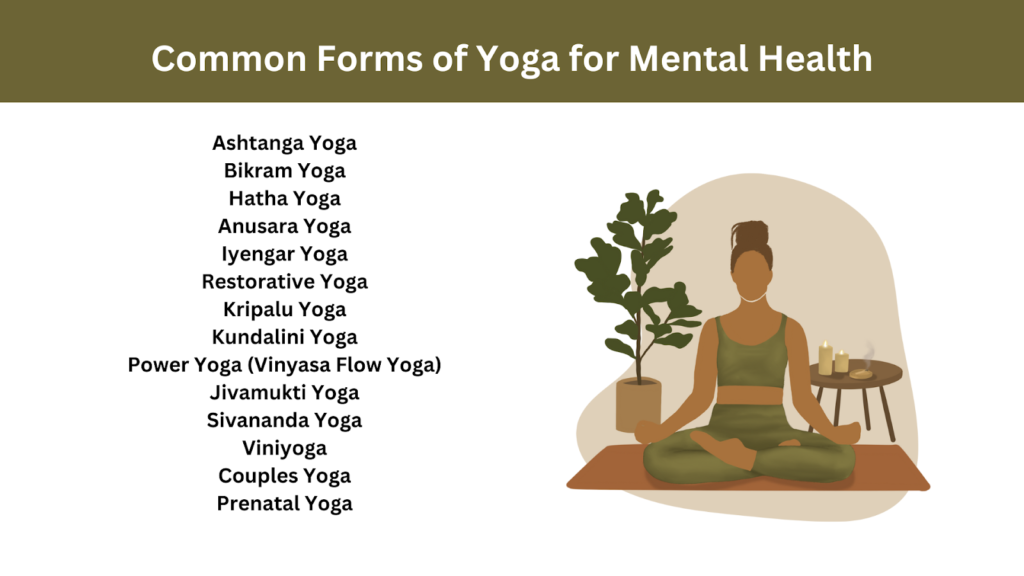Yoga has long been recognized for everything from flexibility to strength in its physical benefits. Over the past few years, the mental wellbeing advantages of yoga have gained broadened consideration. Whether it’s diminishing stress, compensating for signs of uneasiness and depression, or assisting mindfulness, yoga offers an all-encompassing approach to mental well-being.
It is the ancient practice of weaving breathing techniques, meditation, and physical postures in a unified way to finally calm the mind, strengthen the body, and nourish the soul. We go deep into the profound mental health benefits of yoga and find out why it should be a staple in your mental wellness regimen.
The Connection Between Yoga and Mental Health
The link between yoga and one’s mental well-being is well-documented. Since it is combined physical, mental, and otherworldly in nature, there can be no superior strategy of adjusting your body and self with the rest of the world. The practice of yoga gives a person a deeper understanding of their body and mind, thus allowing them to know inner peace and the attainment of a state of equilibrium better. More specific locations, like Fort Lauderdale, enhance this effect.

Scientifically, it was also known that yoga regulates the body’s response to stress. While doing yoga, one triggers the parasympathetic nervous system that takes the body to a relaxed stage and lowers the level of cortisol responsible for the generation of stress in the body. These changes will directly influence mental health and reduce the incidence of anxiety, stress, and depression. Most quality rehabs in Fort Lauderdale integrate yoga into their treatment modalities for selected patients.
It also provokes the release of endorphins, popularly known as “feel-good” hormones. These chemicals will elevate an individual’s mood and emotional resilience to help in tackling such problems as depression and anxiety.
Yoga for Stress Reduction
Stress is among the most common issues concerning peoples’ mental health today, including work-related stress and family pressures-the pace of modern life. Managing stress is critical in general mental health. The combination of mindfulness with some physical activities can make yoga an effective, natural way to combat stress.
Specific yoga asanas are designed to release tension of the body. Some examples include the child pose, where the nervous system is calmed, along with forward folds and reclining twists. Controlled breathing with these postures quiets the mind and lessens stress while developing inner tranquility.
Yoga will help you build a safe haven wherein your psychological shield may be allowed to reset and refocus from the daily pressures that come on. It allows you to manage stress better, handle challenges with confidence, and find a greater sense of balance in your life through its regular practice
Yoga for Anxiety and Depression
Anxiety and depression are two of the foremost common mental health illnesses, so they have to be reduced. This enduring of millions around the world is a critical one. In expansion to these traditional treatments, such as treatment and medicine, yoga can offer a complementary norm within the exertion to reduce indications and progress one’s well-being.
The emphasis on conscious breathing and movement puts yoga in place for the reduction of anxiety. Individuals learn pranayama, the regulation of breathing through breathing exercises that calm the mind and reduce anxiety. Some easy techniques, like alternate nostril breathing or deep belly breathing, can easily make a difference in managing anxiety during the most normal scenarios.
Likewise, yoga’s effect on depression may be positive through providing enhancements in mindfulness and reduced rumination or disposition towards brooding. Restorative yoga with its gentle postures and long-held stretches activates the parasympathetic nervous system hence offering or provoking conditions of relaxation and inner peace.
It also enhances self-compassion and self-awareness, thus helping an individual to realize and discard negative thinking habits that are the root cause of depression.
How Yoga Encourages Mindfulness and Emotional Balance
One of the prime components of yoga is mindfulness, the state of being in the present. Through the method of breath and real sensations centered on yoga, it educates people how to be more mindful of their contemplations, feelings, and responses. It is from this greater awareness that there is a possibility of developing emotional balance and minimizing negative feelings.
In today’s fast world, it is very important for people to be mindful in taking care of their mental health. Yoga practice will slender them down, teach them to observe their thoughts without criticism, and thus rise up to more challenges with clarity rather than reactivity. This can help reduce stress related to so many serious issues of life, such as the problems of loved ones with alcohol addictions.
Such effects can be furthered when done in some beautiful places, such as Fort Lauderdale. Combining physical movement with mindfulness, yoga offers a rather rare form of therapy in regulating emotions and building psychological resilience. In this manner, ongoing practice allows individuals to make beneficial changes in their responses towards life’s challenges, making them easier to cope with and navigate through life’s ups and downs with grace.
Incorporating Yoga into Your Mental Health Routine
In the event that you’re a total beginner in yoga, then it doesn’t need to be overpowering to consolidate into your mental wellbeing schedule. There are various styles of yoga, each serving a distinctive reason and shifting levels of wellness.Those who would want to focus on their mental well-being may consider Hatha yoga, Restorative yoga, and Yin yoga as excellent starting points. These styles emphasize slow, deliberate movements and deep stretches, which are highly effective in stress relief and emotional healing.
Start with only a few minutes into the day. Conscious movement and breathing for as little as 10–15 minutes can make quite a difference in the mind. Gradually, with more practice, sessions may be lengthened along with varied intensities as you feel comfortable doing so.
Whether it be attending a class, following along with an online tutorial, or just doing it on your own, consistency is key. With consistent practice of yoga, one can truly experience changes that range from reduced anxiety to improved emotional regulation.
Yoga for Better Mental Health
In short, Yoga offers a capable, all encompassing approach to mental wellbeing that goes past conventional treatment or medicine. Its combination of physical development, breathing works out, and mindfulness makes it a fruitful tool for overseeing stress, uneasiness, and sadness. Whether you are a prepared specialist or unused to the practice, adding yoga into your mental wellbeing schedule can assist you discover adjust, inward peace, and enthusiastic flexibility. By grasping yoga, you are not just moving forward your physical well-being, but moreover contributing in your mental wellbeing for a more adjusted and satisfying life.
Questions on Yoga for Mental Health
Can yoga help with anxiety and depression?
Yes, yoga has appeared to decrease indications of anxiety and misery. Yoga makes a difference by directing the body’s reaction to stretch through the method of careful breathing, development, and reflection that advance unwinding and improve generally enthusiastic well-being.
How often should I practice yoga for mental health benefits?
A frequency of three to four times a week has been considered adequate for the benefits of yoga practice on mental health. However, even a few minutes of yoga each day may benefit your mental health.
What kind of yoga is considered best for stress relief?
Restorative yoga, Yin yoga, and Hatha yoga can help minimize the depth of stress. These forms are gentle and contain deep stretches that accommodate subtle movements with the focus of the mind to release tension and allow relaxation to occur.
Can Yoga for Mental Health Be Done by Beginners?
Absolutely, yoga is for all, be it a complete beginner or the fittest of them all; a beginner will benefit just as much as an experienced practitioner with the mental health benefits involved. It’s important to begin with a practice that feels comfortable and manageable to you.
How does yoga promote mindfulness?
In addition to postures, yoga provides for mindfulness: one has to pay great attention to breathing and the sensations created in the body during every posture. This practice of being present in a moment highly prolongs awareness over thoughts and emotions and keeps emotional balance, reducing stress.

